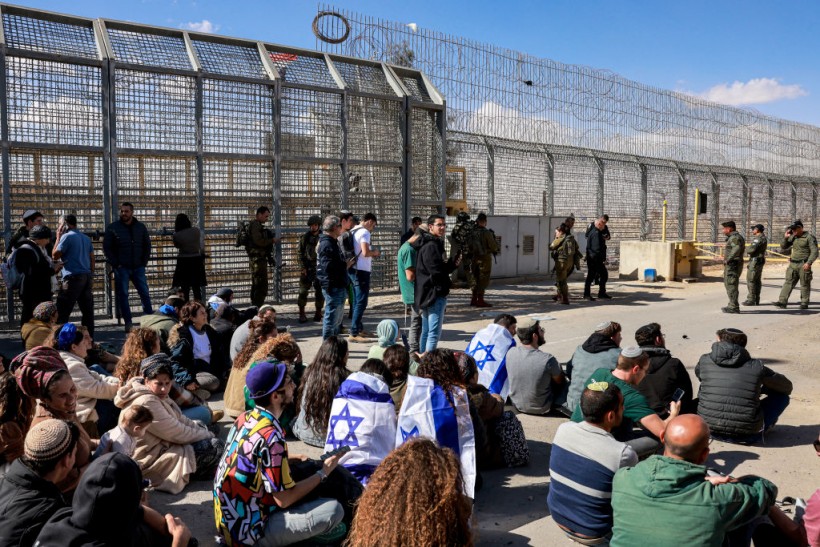A meeting facilitated at Camp David in 1979 by former U.S. President Jimmy Carter between Egyptian President Anwar Sadat and Israeli Prime Minister Menachem Begin solidified the beginning of a landmark accord that allowed over 40 years of peace between the two countries.

Israeli demonstrators gather by the border fence with Egypt at the Nitzana border crossing in southern Israel on January 30, 2024, as they attempt to block humanitarian aid trucks from entering into Israel on their way to the Gaza Strip amid the ongoing conflict between Israel and the Palestinian militant group Hamas.
That peace has held a bond through two Palestinian uprisings and a series of wars in the region. With Prime Minister Benjamin Netanyahu ignoring overwhelming international criticism for the Israeli assault on Gaza and its civilians, the Egyptian government is threatening to void the decades-old treaty.
The Associated Press touched on the history of Egypt and Israel, noting they have fought four major wars, most recently in 1973. The agreement shocked the world when Sadat broke with other Arab leaders and decided to engage with Israelis.
Under the peace treaty, Israel agreed to withdraw from Sinai, and in return, Egypt would leave demilitarized. Israeli ships were granted passage through the Suez Canal, a key trade route. The countries ultimately established total diplomatic relations in Israel's first peace agreement with an Arab country.
"The Camp David Accords were led by three brave men who took a bold stance because they knew the lasting effects for peace and security, both then and for the future. We need the same kind of leadership today, and it is currently lacking in the Israeli government," said Paige Alexander, chief executive of the Carter Center.
Two Egyptian officials and a Western diplomat told The Associated Press on Sunday that Egypt may suspend the peace treaty if Israeli troops invade Rafah.
Netanyahu says Rafah is Hamas' last remaining stronghold after more than four months of war and that sending in ground troops is essential to defeat the group.
Egypt has long opposed any move by Israel that could send Palestinians fleeing across the border into its territory. Rafah is also the besieged territory's main entry point for humanitarian aid, and an Israeli attack could stifle the deliveries of key, supplies more than they already have, leaving many Palestinians under extreme, dire conditions.
According to the AP, Rafah's population has grown from 280,000 people to an estimated 1.4 million as Palestinians continue to flee from Israel's onslaught. Hundreds of thousands of those evacuees are living in slummish tent camps and cramped outside along the border wall.
Netanyahu has ordered the military to prepare a plan to evacuate all Palestinian civilians before the offensive starts. But it remains unclear where they will go.
Netanyahu said Sunday that they would be able to return to open spaces farther north. But those areas have been badly damaged by the Israeli offensive, leaving nothing but ruins in their wake.
What Happens If Egypt Voids The Treaty with Israel?
If Egypt were to nullify the agreement, it could mean that Israel could no longer rely on its southern border. Amping up forces along its border with Egypt would no doubt challenge an Israeli military already thinly stretched.
But it would bear serious ramifications for Egypt as well. Egypt has received billions of dollars in U.S. military assistance from the U.S. since the peace agreement.
Should the treaty be voided, it would compromise funding, and a massive military buildup would also add strain to Egypt's already struggling economy.
Alexander said that if Israel attacked Rafah, it would "threaten to draw Egypt into the hostilities, which would be catastrophic for the entire region."









